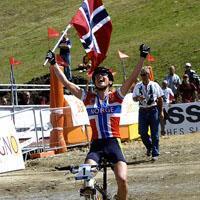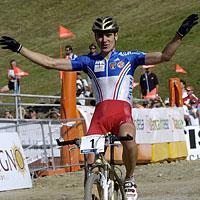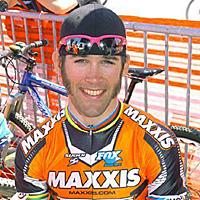
Recently on Cyclingnews.com |
MTB index page for all MTB content
MTB News & racing round-up for September 7, 2005, part 1Edited by Steve Medcroft Welcome to our regular round-up of what's happening in the dirt. Feel free to send feedback, news and gossip to mtb@cyclingnews.com
UCI Mountain Bike World Championships wrap upBy Steve Medcroft
The 2005 Mountain Bike World Championships was a showcase for the best in the world to prove why they’re the best. Defending Champions and Olympic Gold medalists Gunn Rita-Dahle (Norway) and Julien Absalon (France) reclaimed the Cross Country titles on Sunday. Former multi-time downhill winner Anne Caroline Chaussen snuck off with one more World Championship jersey before retiring. Frenchman Fabien Barel, after winning his National Championship and the European Championship already in 2005, took care of business in the men’s downhill. The exceptions to the show of European dominance came from a pair of Americans (Brian Lopes and Jill Kintner) winners in the Four Cross competition. Kintner earned her first World Championship jersey and former Champion Lopes was just back to World Championship competition after two years lost to injuries. Here’s a quick run down of the action: Cross country
The women’s Cross Country field might as well get used to coming second to Gunn Rita-Dahle. The Merida/Multivan pro recently said in her Cyclingnews diary that she’s signed a six-year deal with her sponsors and is committed to at least three more years of racing; she intends to defend her gold medal in the 2008 Beijing. Since she’s won about 80 percent of her major races and 100 percent of her championship attempts in 2005 (Word Cup, Marathon and European and now World Championships), every other woman in racing better think solely on how they’re going to unseat the Norwegian if they want to place better than second place. Dahle put her phenomenal dominance on display at the UCI World Championship races this past weekend, opening a thirty-five second gap on her chasers in the first of two and a half laps and never giving a second of time back. “Today was a perfect day for me,” she understated after the race. Poland’s Maja Wloszczowka took the silver and Switzerland’s Petra Henzi took third. In men’s Cross Country competition, 2004 Olympic Gold medalist Julien Absalon (France) successfully defended his World Championship title but not with the ease that Dahle defended hers. From the gun, Marco Bui (Italy) strung out the field. Absalon was locked in a chase group with UCI World Cup leader Christoph Sauser (Switzerland), Fredrik Kessiakoff (Sweden) and Ralph Naf (Switzerland). “My strategy for today’s race was to control my rivals then attack after,” Absalon said in the post-race press conference. In the race, Bui blew up after the first lap and the lead shook out with Absalon and Sauser up the trail and Jose Antonio Hermida Ramos (Spain) chasing in third. “I gave my best effort in the second lap to keep the front position,” Absalon said. But effort was not all that was needed; a little luck was just as necessary. “I flatted in the last lap,” Absalon said. “I noticed that I was losing pressure at the first feed area, but I didn’t think it was a flat so I climbed the big uphill with the tire (like it was). I stopped at the 2nd feed area to fix it and I noticed that Christoph (Sauser) also flattened.” Absalon said he was nervous, but knew as long as he could retain the advantage, he could win. And he did. Downhill
On the eve of her retirement, the women’s Downhill crown went to Anne Caroline Chausson (France); her nineteenth world title. At the post-race press conference, she was asked about returning to BMX for the Beijing Olympics, but said that she is finished with all competition. "I am stopping because I don't want the stress of racing anymore. It was my plan to stop last year, in France (at the Worlds in Les Gets), but I broke my collarbone during training and could not race, so I decided to go one more year.” Chausson has a three-year contract with sponsor Commencal-Oxbow and says she’ll spend the rest of her career focused on freeride. In the men’s downhill race, 2003 World Champion Greg Minnaar (South Africa) has locked up the World Cup title already and was showing the kind of control in downhill that almost certainly means a win. But just like in the Cross Country races, the defending champion, Fabien Barel (France) was in a winning mood of his own. He wanted a trio of 2005 championship jersey collection to rival Dahle’s having won the European Championship and his National Championship earlier this year. Barel posted a .77 seconds faster time than former Junior World Champion Sam Hill (Australia) to win. Minnaar came in third. Four-crossThe men’s Four Cross came to halt after 2003 World Champion Michael Prokop (Czech Republic), took a nasty spill off berm and had to be carried off the course on a stretcher with what appeared to be a broken leg. Brian Lopes (USA), who had qualified well and worked his way through the brackets, found himself in the final against with Jared Graves (Australia), Mickael Deldycke (France) and Greg Minnaar (South Africa) but was able to hold a super-fast start all the way to the finish for the win. Kintner says she prepared herself for the 2005 World Championship Four Cross race through focused training, diet and by working on techniques she struggled with. When it came to Championship race time though, she narrowed her focus down to having solid gates. "I think the key here was to qualify well and get the inside gate,” she said after the race. “After that, it was 'stay calm, do a good gate, and don't make mistakes in the first turn'." Kintner had the advantage after the first double in a final alongside Katrina Miller (Australia), Tara Llanes and Melissa Buhl (both USA) and held on to claim her first World Championship jersey. MTB World Championships, Ita (CM) Aug. 31-Sept. 4: Chris Eatough: 24-Hour lone gunman & six-time world championBy Steve Medcroft
At 12:08 p.m. Sunday, Chris Eatough claimed his sixth consecutive 24 Hours of Adrenalin World Solo Championship. The Trek/VW endurance star said this year’s race was more challenging than all the others before it. He explained why to CyclingNews’ Steve Medcroft while traveling to Mammoth Mountain, California, where he’ll try for the U.S. National Marathon Championship on September 15. Cyclingnews: You’ve won six straight 24-Hour World Championships. What is about this race or this format that keeps you coming back? Chris Eatough: Because this is the kind of race I made my career on. Plus my sponsors like it; it’s the race Trek wants me to do. And 24 hours is still an emerging discipline. If it grows - if we get some TV coverage or the kind of recognition that an event like the Ironman (Triathlon series) does - I’d like to be here and be at the top when it does. CN: You’ve done more cross-country and marathon-format racing this year. Did it affect your preparation for 24 Hour Worlds? CE: Doing more marathon racing did change my prep. I thought marathons would be good for me but they just weren’t as long as I expected; I did a lot of three and a half hour races when I really needed six or seven hours. I developed some speed but for 24 hours, you need longer training rides. So this year (in 2005 Worlds), I lacked a little durability and strength. CN: You’ve become somewhat famous for fast pits and methodical preparation (Eatough spends less than three minutes at any one time in a pit and in six World Championships has suffered only one mechanical issue; a flat tire). Where did the approach come from and did you change anything this year?
CE: My dad and I came up with a lot of the original thought on how to be efficient – and it boiled down to common sense and the idea that I needed to be out there riding for every possible minute and spend no time in the pits. We figured that five minutes wasted in the pits equated to a mile on the course. It would take an hour to make that mile back up on the bike. And while my dad is still an important part of the race, this was my first full year with true factory support and Jon Posner, the Trek Factory Team manager, took charge of the pit. They did a great job for me and it was really important for me to show them I could continue to do this and thank them for the support they’ve showed me throughout the season. CN: How did the race go for you? CE: I’ve never been rained on for an entire 24 Hours race before. It was raining – a steady or hard drizzle that only ever let off a little - before the race started, raining on the start line and raining at the finish. It wasn’t too cold – in the fifties – but when you’re wet all the time, fifty degrees feel cold. I’ve never done one of these where the conditions were that bad. CN: You ended up with 22 laps, one more than last year on a course that was supposedly longer and steeper. So how did you cope? CE: I changed clothes a few times and wore a really good jacket and rain paints. It helped for a little while but there was nothing you could do. It was like standing in a car wash; it didn’t matter how well dressed you were, you just got wet. I had to focus on keeping the laps consistent and doing all the things we know how to do. CN: Your main challenge came from a somewhat unknown (in 24 Hour Worlds circles) racer; Ernesto Marenchin. CE: Ernie rode really well. I didn’t know a whole lot about him. He had the race of his career and I guess my lead was around 30 minutes the whole race so we kept our eye on him. When he was able to reduce the gap, we made sure we put in a couple of good laps to keep him back there. CN: What’s next on your list of goals? CE: I’ll be racing the Super D and Marathon Nationals. I’m doing Marathon, of course, because it fits my endurance-racing mold but I’m doing Super D because it’s a fun, new and exciting aspect of the sport. It’s the kind of riding most people do when they’re out with their friends; you ride a regular cross country bike on trails with more technical downhills than you normally get in cross country. Read the 24 Hours of Adrenalin Solo World Championship race report and results here.
An interview with Geoff Kabush, September 3, 2005 - King of NORBA heads for EuropeBy Steve Medcroft It's been a super 2005 for Canadian mountain biker Geoff Kabush. Overall victory in the NORBA cross country and short track series and a national championship put a shine on his year. With the world championships taking place this weekend, the Maxxis rider has still got plenty on his plate before he can relax. But Kabush is no stranger to juggling a dozen demands at one time as Cyclingnews' Steve Medcroft found out.
If you had seen NORBA XC and STXC series winner Geoff Kabush (Team Maxxis) the Monday after the Mount Snow NORBA finale, you might have thought of him as yet another frantic corporate road warrior in a rush to make his next travel connection. The 2005 Canadian National Champion started his day stuck at his hotel waiting for a UPS delivery, then had to drive four hours to Boston's Logan International Airport for a mid-afternoon flight while juggling luggage, rental car return, airport security and calls from pesky reporters wanting to know how he felt about his repeat as series champion. Gee, don't those guys know when to quit? Geoff Kabush's dominance in NORBA National Series mountain biking stretches back to 2004 when, three years after he 'broke out' by making Canada's 2000 Sydney Olympic MTB team, Kabush reached the pinnacle of the prominent US Circuit and took his Cross Country title. Then he did something unconventional; he kept racing. Kabush finished second the six-race Crankbrother's US Gran Prix of Cyclocross and won the Canadian Cyclocross National Championship over the following three months, extending his racing form much later than conventional wisdom said he should. So coming into the 2005 mountain bike season the question lingered; would Kabush be as dominant as he had in 2004 or did he sacrificed his form for winter glory? Read the entire Geoff Kabush Interview here.
UCI announces changes in 2006 World CupBy Rob Jones The UCI Mountain Bike Commission, headed by President Daniel Baal, held an hour long briefing conference this morning to discuss numerous changes that will be implemented for the sport of mountain biking, starting in 2006. The briefing was wide ranging, covering everything from the World Cup, to new ranking systems, Olympic qualification and age categories. 2006 World Cup The UCI has been working with 23 Degrees Sports Management (Martin Whitely) and Gestev (Canadian organizers of World Cups and world championships) to outsource the management of the World Cup, but doesn't feel the arranegement has been a success. "The World Cup is the high point of the mountain bike season, but we regret that there have been no sponsors or TV program for the last two seasons," said Baal. "In 2004 we talked to the organization (23 Degrees and Gestev) about outsourcing management of the World Cup for 2006. For this year they had the possibility (of taking charge of the World Cup), and worked for one year. They did not have success. Despite a lot of effort and energy, there were not sufficient guarantees to start the agreement for 2006. Unfortunately, the marketplace and the economic conditions do not show the (required) interest in this program. The UCI has another solution. “We will continue to manage the World Cup in conjunction with organizers," said Baal. "There will be six events in each specialty (cross-country, marathon, downhill, 4-cross). The schedule will be announced at the latest by October 1st. We have to face the economic realities." Subsequent to the briefing, Cyclingnews spoke with Gestav co-owner Patrice Drouin who said his management team have had only 7 months (not 1 year) to work on the series and that they do have a 2006 distribution agreement in place - which will cover distribution to 100 countries – but it is not yet signed. Drouin said that the agreement is "very close" to being signed, and once that happens, sponsorship will fall into place. He says he had meetings with the UCI yesterday, and believes there is still the possibility of an agreement falling into place for October 1st. His group had selected eight venues (which they supplied to the UCI); six will now be selected for the 2006 season. The program proposed began the season with an event either in California or "the Caribbean", and one of those events is still quite likely to be the opening event. New categories and ranking system: The UCI will make a large number of changes to categories and the way points are awarded. The main changes are: There are four separate formats for the sport: Olympic cross-country (traditional cross-country), marathon, downhill and 4-cross. Only cross-country will be used to determine Olympic quotas, which need to be approved by the IOC. This removes the situation we saw in mountain biking prior to the 2004 Athens Olympics when some countries leapt up the rankings by scooping up marathon world championship points. National quotas will be determined by nation rankings, and these will be calculated by adding together the individual rankings of the top three Elite riders in each of the men's and women's categories. For the 2008 Beijing Olympics, the 2006 and 2007 results will be used to determine quotas. For the 2012 London Olympics, 2008/2009/2010/2011 will be used. This will force nations to support the World Cup in order to qualify for the Olympics. The points scale will be changed (not yet announced). There will be an Espoir (U23, aged 19-22) category for the world and continental championships. The UCI will also encourage national federations to incorporate this modification into their categories. Separate Espoir events will be encouraged for other events, but in the absence of a separate category, Espoirs will compete with Elites. Junior rankings will be added for the World Cup Downhill, and there will be only one category: age 17 and over. This is similar to 4-cross. There will be separate points tabulated, and a Leader's Jersey will be awarded to the top Junior. The Marathon World Cup will have only the 19 and over category. The world, continental and national championships will retain separate categories and jerseys. Riders will no longer be required to have one UCI point in order to be able to enter downhill events. The new UCI rankings will be reset to zero on January 1 each year. The overall rankings from the previous year will determine start position for the first World Cup of the season. The UCI registered trade teams will continue to receive "advantages", including team names on results, listing in the team rankings and free entry (no fee) for World Cups:
Teams will continue to have contractual obligations and have to pay a 1000 Euro registration fee. Teams are limited to a maximum of 10 riders per format and per team. Other changes Medical monitoring will be mandatory for the top 100 UCI ranked men and top 20 women in the cross-country. In marathon it will be the top 20 men and top 10 women from the final World Cup standings of the previous season. The rankings used will be the final rankings at the end of the previous year. National federations will be responsible for the monitoring. (All rights reserved/Copyright Knapp Communications Pty Limited 2005) |






